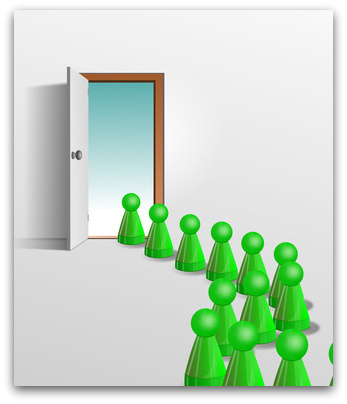5 Productivity Habits That Will Help You Get More Done
As coaches you may be encouraging your clients to use some/all of the habits Shawn Lim shares in today’s guest post, but are you remembering to use them yourself?
5 Productivity Habits That Will Help You Get More Done
By Shawn Lim

Want to learn how to be more productive and get more done? This is exactly what you will discover in this article. Most people are having a hard time trying to dig more time to get more of their tasks done, unfortunately, having more time does not equals to being more productive.
Some people spend 20 hours and get nothing done, while some people spend 5 hours and get a lot of things done. It depends on how you use your time and how you manage yourself.
Here are the 5 productive habits that will help you get more done. Use these techniques wisely and adopt them as your habit…
1. Nothing Beats Planning
If you want to get more done, you definitely have to plan for your day. When you did not plan for your day, you will go through your day in reactive mood. Doing whatever comes to you instead of being proactive and getting things done.
Most people find it difficult to plan. Planning can be as easy as writing down 3 or 5 most important tasks before you start your day and get them done as soon as your day started.
2. Use Productive Language
Do you know that your language, the words that you use and the way you talk to yourself can affect your productivity? When you need to get something done, notice what is the first thought that comes into your mind? Is it, “Gosh, this is too much and I just can’t get it done in time.”
If you think about it this way, you will never be productive. Next time, try to adopt this thinking, “what is the one thing that I can get done within 10 minutes to settle this task?” When you think it this way, you automatically focus into small chunks of work you can do within 10 minutes and get it done straight away.
3. Time Blocking
Time blocking is one of the most powerful techniques about productivity that anyone can leverage on. Simply time block your calendar or your day-to-day schedule for the task you want to get done and do it when the time comes.
For example, when you write down you wanted to call 20 clients from 10am to 11am that is exactly what you are going to do. No excuse and you will not do other things except that. That 1 hour time slot is for you to call your clients. This is what it means by time blocking.
4. Undivided Focus
Forget about multitasking, it is not a great method to get more things done; instead, it will drag you down and slow you down. A lot of people thought that multitasking is the way to go, but in fact, it is not a good strategy to be productive.
You will only be more productive when you are in the flow and when you tap into your potential to do things naturally. However, if you multitask, your mind will switch from task to task, from one thought to another thought, back and forth. This will slow down your creativity and break your flow.
5. First Thing First
Do the most important thing first when you start your day. Pareto Rule says that 80% of your work contributes to 20% of your result and vice versa. Therefore, the first thing you need to get done once you started your day is to do the 20% work that will give you 80% of the results.
When you get your most important task done early in the morning, you will feel more accomplished and you will feel satisfy. And when you feel satisfy, your confident will boost and you will be able to get more done since you have got the momentum going.
These are the 5 productivity habits that will help you get more done. Remember, you need to focus in your task and put in 100% of your concentration if you want to be in the flow. Plan your day either the day before or early in the morning before you start you day.
More importantly, think and talk to yourself in a productive and positive way. Use time block to stay focused and do the most important task first.
About Shawn Lim
Shawn Lim is the founder of Stunning Motivation. He has more than 7 years of experience in the personal development industry and has helped countless hungry seekers to achieve outstanding success in life.
To learn more about him, visit www.StunningMotivation.com now.
Article Source: 5 Productivity Habits That Will Help You Get More Done
Ezinearticles expert page: Shawn Lim




 Specialising in Inspirational Leadership, Frederique Murphy is a mindset strategist who inspires leaders to believe and accomplish the extraordinary. With her Mountain Moving Mindset (M3) platform, she equips you with scientifically-based strategies to take your life, career and business to a whole new level: she makes change happen. With over 15 years of experience in corporate change and expertise in positive psychology, neuroscience and behaviour change, she helps your organisation reap the benefits of tapping into the power of the mind. Frederique is a passionate and charismatic speaker, who captivates audiences – when she takes to the stage, sparks fly and beliefs, attitudes and behaviours will be instilled to create lasting change. For more information on Frederique’s transformational services, visit
Specialising in Inspirational Leadership, Frederique Murphy is a mindset strategist who inspires leaders to believe and accomplish the extraordinary. With her Mountain Moving Mindset (M3) platform, she equips you with scientifically-based strategies to take your life, career and business to a whole new level: she makes change happen. With over 15 years of experience in corporate change and expertise in positive psychology, neuroscience and behaviour change, she helps your organisation reap the benefits of tapping into the power of the mind. Frederique is a passionate and charismatic speaker, who captivates audiences – when she takes to the stage, sparks fly and beliefs, attitudes and behaviours will be instilled to create lasting change. For more information on Frederique’s transformational services, visit 


